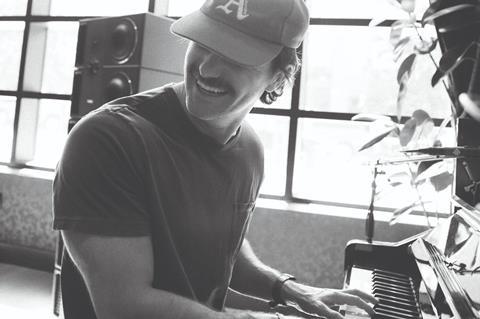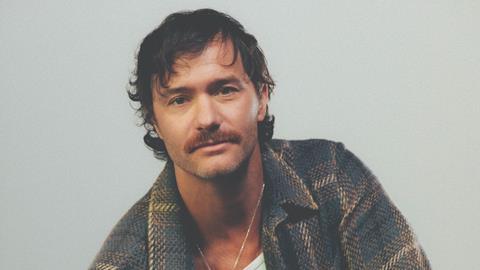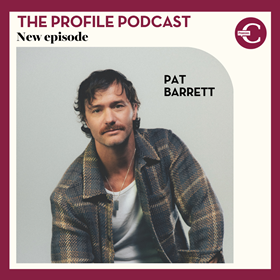Don’t believe the hype. That’s what God told Pat Barrett just before his songs became global sensations. Ahead of his appearance at Big Church Festival, the worship artists tells Sam Hailes why he loves coming to England
Christian music is having a moment. Online streams of worship songs are up by 60 per cent over the past five years. Another report even found that more people listen to Christian and gospel music than jazz and classical combined. It’s led the popular magazine Billboard to recently declare: “Christian music is making a serious comeback.”
Of course, for most Christians, it never went away. Many of us are accustomed to belting out worship anthems every Sunday. Two of the most popular in recent years have been ‘Good good Father’ and ‘Build my life’, both written by Pat Barrett, formerly of the band Housefires.
In a matter of days, the Atlanta-based musician will lead more than 30,000 worshippers in song at Big Church Festival (22-24 August). He will be stepping into the Saturday afternoon slot originally set to be filled by the Newsboys, who were dropped from the line-up following former frontman Michael Tait’s admission of serious moral failings, including drug abuse and sexual misconduct.
So many of those early years of leading worship were about failing. It didn’t sound great, it didn’t look great, but that’s not the point
Those revelations have sent shockwaves through the Christian music industry, prompting hard questions and deep reflection. Not least, how can worship leaders avoid the spiritual pitfalls that can come with fame and global touring?
I didn’t bring up the Newsboys by name during my conversation with Barrett, but that’s because I didn’t have to. We’ve barely begun to speak before he signals he wants to have an honest conversation about the current state of worship music, and how Christians can operate with humility and integrity in a world full of platforms and publicity.
It seems I’ve caught him in a reflective mood. Barrett grew up in a Christian home and has been leading worship since he was a teenager. Now, more than 25 years later, he is openly wrestling with the tension between promoting your songs (and perhaps yourself) on social media with Christ’s call to deny yourself and take up your cross. And it’s not just him. “Most of the people I know are having this conversation regularly,” he says.
Were there worship songs that influenced you as a young person?
Yeah – from your island! I mean, Delirious?, Tim [Hughes] and Matt [Redman]. That music felt like just a breath of fresh air to our world. And writers over here like Chris Tomlin, The Passion movement and Hillsong United. I have memories associated with so many of those songs.
Did you start to lead worship very early on?
I was probably about 14 when a group of us really had our hearts changed by the Lord, and we decided to start writing music together.
I think the adults around us were like, what’s going on with these kids? There was a mini revival of sorts in our high school with friends coming to faith. And music was a huge part of that. It was so grassroots – who’s got a guitar? Let’s meet outside on the lawn – none of it felt official.
You didn’t ask me this, but I’m curious if the norm today is that there’s a camera in front of you when you’re leading worship. And I don’t know if that would have encouraged or discouraged me, to be honest, because so many of those early years of leading worship were about failing. It didn’t sound great, it didn’t look great, but that’s not the point. [I worry when it comes to] formation and discipleship that no one’s allowed to develop anymore – you have to be ready for a camera. That wasn’t there in the early days for me.

Yes, the invention of smartphones and social media has enabled us all to live in quite a public way, if we choose to. I also wonder what humility looks like for Christians who are using these tools to broadcast their music to the world. Is there a tension there?
Oh, yeah. I mean, this opens up a whole other can of worms. We’re encouraged by that medium to present the best version of ourselves. I’m not hating on that necessarily. But I am saying, I hope we haven’t lost the space that is away from viewership. The most important parts of life are never caught on camera. The moments where you’re struggling in faith, or where you have mentors, leaders and a community that that helps you along the way – those are camera-shy moments.
Maybe the ratio is: for every minute that you’re in front of a camera, hopefully there’s 99 that you’re not – you’re not thinking about that, and you’re not leveraging faith for your own career, because Jesus had a lot to say about things being done secret. It’s not good for us to be the centre of attention in our own world. It’s not good for our heart for us to think more highly of ourselves than we ought [see Romans 12:3]. It’s not good for our mind when we walk into a room that we assume we’re the star of the show, or we choose the seat of honour [see Luke 14:8]. These are really practical things that Jesus talked about. If you practise some of these things, are intentional and get used to deferring yourself and letting yourself die daily, then your mind won’t always default to me me me.
Another worship leader and songwriter, Cory Asbury, said recently: “Scripture says, ‘do not let your left hand know what your right hand is doing’ [Matthew 6:3]. Yet, we hire entire promo teams to film us and tell the world how great we are.” So, there’s some interesting self-reflection going on from people who are prominent in the worship space…
Yeah, I don’t know someone who’s not [reflecting on these issues]! Most of the people I know are having this conversation regularly, and I think it’s really important.
We elevate the stage and the platform. But the ground before the stage is just as holy
I’m working on an album right now, and the first song I started writing is called ‘My Father’s business’. The original version was a lot more cutting and probably too critical, but the chorus is: “God forgive us for the times we called it praise, but it was showbusiness…Fan the flames of holiness and true repentance / Purify our hearts to do our Father’s business.”
Sometimes our highest aim is building our own thing, our own name, our own brand, our own music career, or whatever. I don’t want to project onto anybody else; I’m just looking at my own life. The practice of the faith that we adhere to is really simple and really difficult. When you read the Sermon on the Mount, Jesus addresses the root reflexes that we live through our whole life – there’s a reason why he says: “turn the other cheek” [see Matthew 5:39], because no one does that naturally. You have to practise it.
If you’re praying and no one knows you’re praying, if no one sees most of your spiritual activity and the lion’s share of your time looks like that – then in moments like this [a media interview] you don’t feel as impacted by it negatively or positively, because this isn’t the majority of my life. My faith is lived most often in private, which I think is really important, and there’s a medicine in that, which we don’t like!
You’re best known for writing ‘Good good Father’ and ‘Build my life’ – two songs which have been sung by millions all over the world. When songs blow up in this way, some people say ‘God breathed on that song’ – as if there’s a miraculous or God-ordained element to a song’s success. Others say a song did well because there was a million-dollar marketing budget behind it. What’s your view?
Man, if you would have asked me this ten years ago, I would have probably used really spiritual language. But now…I think God breathes on things all the time that we never see, and that aren’t popular. So, I think to equate favour or blessing with reach is the wrong way of looking at it.
I’ve realised there’s certain things that I’ve over-spiritualised, and there’s other things that I’ve under-spiritualised.
What do you think we under-spiritualise?
In a lot of spaces I’m in, we elevate the stage and the platform. But the ground before the stage is just as holy to God.
We have these highlight moments in our lives that are few and far between, but the invitation of the kingdom is to find miraculous contentment and purpose in all of life, because Jesus participated in all of it. Jesus knows what it feels like to be a seven-year-old or a 13-year-old. If God’s willing to participate in it, I think we should, too, with our whole heart. And then, all of a sudden, it allows all of it to feel miraculous. You can’t make your heart beat. Your breathing is involuntary. All of it is a gift. To see it as less than that is to belittle the giver. And what a beautiful thing if you can wake up and be like: I’m eating breakfast with my kids right now, and God loves this. And tonight I’m gonna be leading worship at Big Church Festival, with a lot of people, and God loves that. Does he love that more than this? No, he loves all of it. When we see that, it changes everything.

What about those moments where it’s been hard to worship – what has brought you through those times?
Worship is a choice in a similar way that marriage is a choice. There are times when it’s not natural and it requires something. As per the instruction of the Psalms, I have given myself permission to be my unfiltered self before God when it comes to things in my life that I don’t understand, or that I wish were different.
He’s God in the hard stuff too. He’s not just in it when it goes great. He’s in it when it bombs and the event didn’t go well. And that allows me to detach outcome-based faith and be present with God in the middle of whatever I’m feeling.
God’s not asking for some fake emotion in worship
Don’t miss the Lord in your sadness, and don’t miss him in the grief. Don’t miss him in the pay-off and don’t miss him in the lay-off…[laughs] I’m writing a song right now! If he’s in all of it, that’s absolute permission to not fake some emotion in worship. God’s not asking for that. He’s asking for continued communion in the middle of everything we experience. And that’s a choice.
It’s interesting how so many of the Church’s most loved songs have emerged out of seasons of pain and trial. Whether it’s Horatio Spafford’s ‘It is well with my soul’ after he lost his family in tragedy, or Matt and Beth Redman’s ‘Blessed be your name’ after their experience of miscarriage. People can relate to those songs because we’ve all had deeply painful moments in life when it’s been hard to worship.
I think there’s nothing more relevant to the world right now than the message of Jesus. And sometimes, I think we overlook how profoundly we need Jesus. Does Jesus have things to say about grief and loss? Yes, he does. Does Jesus have something to say about government? Yes, he does. I get the chills thinking about these things. It’s not just songs. The songs are the expression of a kingdom that, if you allow it, will completely change every paradigm in your life.
I love the songs; however, the communion that comes from those experiences are the far greater treasure to me. I’m gonna keep writing songs my whole life, but I don’t want to write songs and miss the communion that those songs come from – like how Matt and Beth had that chance to give someone else language for their loss. It feels like the gift of hospitality. They set a table for us. There’s an offering to God in that, but there’s also an encouragement to other people. And when those are connected, that’s music at its best.

You’ll soon be leading worship at Big Church Festival. What’s it like leading worship in the UK, compared to the US?
This is what I tell people all the time – whenever I go to England and get a chance to play music, I always walk away going, like: “I needed this for me.”
Why?
I live in the Bible Belt in the US, where there’s a social aspect to religion. You get a big social pay-off for just being [in church], because that’s what you do.
But when I go to England, no one’s there [at a Christian event] because that’s what you do. You’re there because you want to be there. So, I feel like I run into a sincerity in England that is highly infectious to me in the best way. It’s like a faith injection. I come back like: Man, I want faith to feel like that. I don’t want heartless duty to be a part of this.
Is it ever strange to be on stage in front of thousands of people cheering for two hours, and then to have to walk off, and go from that adrenaline to silence and perhaps even loneliness? How do you work through that as a Christian?
I’m surrounded by people that don’t think everything I do is awesome (and I don’t think that either.) So, it’s quite easy for me to get off stage and just be like: “Man, I could have done that better. You hear that bad note?” Don’t take yourself too seriously – but be serious about what you do.
I also had to make a conscious choice early on. ‘Good, good Father’ had been written but wasn’t out yet. I was praying one morning, and I heard in my heart: “Don’t believe the hype.” There wasn’t any hype in my life at that point, but I wrote it on my hand: “Don’t believe the hype.” I felt like there may come a time when everyone’s going to tell you everything you’ve wanted to hear. You’re going to get more approval and attention than you ever thought you’d get. And in that moment, you’re going to wonder: Is this what I’ve been looking for?
A few months later, for the first time in my life I’d written a song that seemed like it was starting to spread. It’s usually been the opposite. I had this still small voice: “Hey, don’t believe the hype. Just write your songs and put them out.” There was a merciful warning in it.
And when I read the scriptures, I see the same thing. When Israel moved into the promised land, the warning was: “When you reach this land and you live in houses that you did not build, and you eat from vines that you did not plant, you may think to yourself, my own strength and my own wisdom gave this to me.” And then the next part is: “but who gives you the ability to create wealth?” [See Deuteronomy 8:12-18].
There’s something important in there. If you get attention, you need to take the crown that people give you and give it back to Jesus. “This isn’t mine. This is someone else’s.” You have to continually redirect like that, in an honest way. I don’t mean false humility. I heard Matt Redman say one time about leading worship: “Did anything good happen? God, that was because of you.” And he just gives it back.
To hear the full interview listen to Premier Christian Radio at 8pm on Saturday 16 August or download ‘The Profile’ podcast
Pat Barrett will be leading worship at Big Church Festival later this month. For tickets visit bigchurchfestival.com








































No comments yet